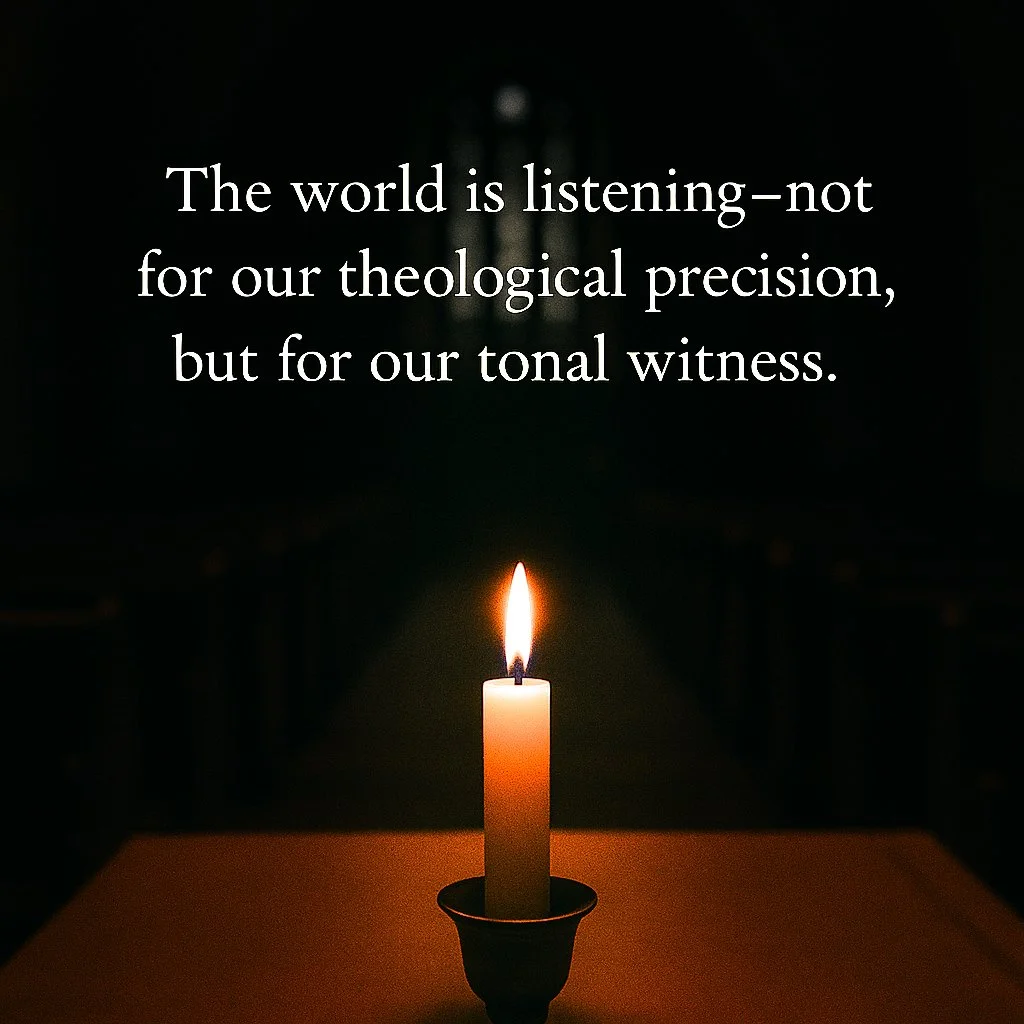Why Christian Witness Demands Tone Over Volume in the Algorithms of Anger
By: Dr. Rian Adams
Prelude: Of Marshalls and Martins
I love the roar of a Marshall Plexi. You feel it in your ribcage before it ever graces your ears. My Les Pauls don’t just respond to that sort of sonic wind… they awaken, bloom, and baptize the air in harmonics so rich they feel sacramental. But some nights, I reach for my old 1966 Brazilian Rosewood Martin D-28. No cable. No pedals. Just wood, strings, a Bluechip pick, and breath. It doesn’t shout. It sings. And when it sings, the room leans in.
Our public life is all Plexi, no Martin. We’ve turned everything to eleven, where every sorrow becomes a slogan and every disagreement a duel.
We’re drowning in digital decibels and clanging cymbals, and its often without a trace of love. The result… mistaking amplitude for authority. We confuse aggression for clarity and mistake indignation for “social impact.”
But followers of Christ are not called to be amplifiers of outrage. We are called to be—God help us—instruments of peace.
The St. Francis Option (No, Not Pope Francis)
“Lord, make us instruments of your peace…” begins the prayer attributed—albeit dubiously—to St. Francis of Assisi. Attribution quibbles aside, the Church often keeps the prayers it needs; provenance bows to spiritual formation.
St. Francis was not a quietist—he was ferocious in gentleness, revolutionary in humility. His prayer reads thus:
Lord, make me an instrument of your peace.
Where there is hatred let me sow love;
Where there is injury, pardon;
Where there is doubt, faith;
Where there is despair, hope;
Where there is darkness, light;
Where there is sadness, joy.O Divine Master, grant that I may not so much seek
To be consoled as to console;
To be understood as to understand;
To be loved as to love.
For it is in giving that we receive;
It is in pardoning that we are pardoned;
And it is in dying that we are born to eternal life.
This prayer isn’t Instagram virtue. It’s a scale for spiritual musicianship: a tonal exercise in Christlikeness. Where there is hatred, let us sow love. Where there is injury, pardon. Where there is discord, union. Not reaction but redemption. Not echo but melody. Not malice, but mercy.
To pray it sincerely is to reject the “liturgies of contempt” that dominate our feeds. It is to pick up a different instrument—one not made for volume, but for virtue.
Theological Tuning: Christology Versus Tribalism
This is where theology matters… Christology (the study of Christ) must conduct the musical symphony, not the sociology of one's digital tribe.
If our identities are discipled more by timelines than by the Crucified, then Jesus becomes background harmony to our cultural solos. But if the Crucified and Risen Christ is the center pitch, then all else—our ideology, our commentary, our “self” must tune to Him.
The Cross is not a Plexi that’s dimed’ out (code for wide open on 11). It is a silenced man bleeding, dripping mercy into the earth with his blood. St. James, blunt as ever, writes: “Human anger does not produce the righteousness of God.” Jesus said, “Blessed are the peacemakers.” St. Paul echoes their message: “Let no unwholesome talk come out of your mouths, only what builds up.” That’s a sacred tone. That’s our ecclesial register.
The Cathedral of Algorithms
Let’s not be coy… there are certain people—ministries even—that have built cathedrals of anger and derision. Their followers live in algorithmic monasteries, where any disagreement is considered heresy, and they equate their volume with virtue. But living in our own algorithmic echo chambers is a recipe for digital Gnosticism—a self-created sect of what I call “epistemic certainty” that cannot embrace the sacred mess called the Incarnation.
If the Body of Christ is real, it includes those outside our algorithms. If grace is real, it will sound like dissonance before it becomes harmony.
The Rule of Three: A Liturgical Lifehack
How, then, shall we live in times like these when every sentence feels like a battlefield, and every silence like betrayal?
1. Choose Contemplation Over Reaction: Before you reply, respond, repost, re-anything—retreat. Let your fingers cool in the font of your own stillness. Let your breath catechize your bones.
2. Speak From the Wound, Not the Weapon: There is power in your pain, but not all power heals. When you must speak, speak from the cut, not with the blade. Let your testimony be “resurrectional,” not retaliatory. Bleed truth, yes… but let it be the kind that waters, not poisons.
3. Honor the Image, Even When It's Cracked: The imago Dei—the image of God in us—is not a reward for holding tight to orthodoxy. Oh no! Rather, it is a birthright. I’m suggesting that we should not deny the divine in our enemy, even when they spit scripture like shrapnel. To bless the unblessable is to preach Christ crucified—again and again, until the veil tears.
The Church as Auditory Icon
The world is listening, dear friends. It is listening not for our theological precision, but for our tonal witness. Does the Church sound like the crucified Christ? Does it sound like grace with a backbone? Like love with a liturgical spine?
The Nicene Creed is not doctrinal fine print as much as it is a tuning fork. The Table is not a place for the vindicated but for the famished. The Peace is not a liturgical halftime show but a prelude to the death and resurrection we enact in Holy Communion.
If Christ is Lord, then neither my politics nor my social media feeds can claim sovereignty. If the Spirit bears fruit in our souls, then our speech must taste of self-control and gentleness. And… if our witness begins in sound, then it must reject the roar of contempt and dignify the timbre of mercy.
The D-28 Benediction
I’ll still plug in my Les Pauls… often! There are nights for thunder. But I want my life, my posts, my prayers, and my politics to sound more like that old Brazilian D-28—Wood (on which the Christ was crucified) and breath (the sacred language of the Spirit). Do I fail, of course, we all do. But I hope I can be human and holy… I hope I can be an instrument of peace in a day of the amplification of rage.
Lord, make us instruments of your peace.
Where there is hatred, let us sow love;
where there is injury, pardon;
where there is discord, union.
Tune us, Christ. Then play us as instruments in your hands… for the healing of the world.





